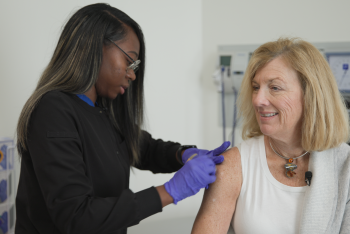Lila's sudden illness led her family to Inspira Medical Center Vineland’s ER, where the team’s rapid...
Read MoreEffective Monday, January 5th, Inspira Health is now at Yellow Alert Status: Masks for staff, patients and visitors in all high-risk areas across our facilities are strongly recommended.

Cold temperatures and snow are part of winter here in South Jersey, making it challenging to stay safe and healthy this time of year. Here are some of the most common cold weather injuries and ways to keep yourself and your family safe.

“Icy surfaces can make you more vulnerable to slipping and falling,” said Michael Holwell, D.O., physician at Inspira Urgent Care East Vineland. “Slip-and-fall accidents can result in serious injuries including sprains, broken bones, head injuries and back issues.” Fortunately, there are precautions you can take to help reduce your chances of falling. When walking on slippery surfaces, keep your knees slightly bent and your hands out of your pockets to improve your balance. Use handrails when available, and wear shoes with rubber soles for optimal traction. Also, carry a cell phone with you at all times in case of emergency.
If you’ve sustained a minor injury from falling, head to a nearby urgent care center to get checked out. If you can’t get up, are in severe pain or think you may have broken a bone, seek emergency care immediately.
Activities such as winter sports and shoveling snow can result in serious injury, especially in the neck, back and shoulders. Before getting your heart rate up outdoors this winter, stretch and warm up your muscles. Use proper form and pace yourself to avoid putting too much strain on your body.
According to the American Heart Association (AHA), more people suffer fatal heart attacks in the last week of December than any other time of the year. “Since the holidays are such a busy time, people tend to miss the warning signs and assume they can hold off on visiting a doctor until after the new year,” said Dr. Holwell. “Instead of risking a fatal cardiac event, listen to your body and seek medical care at the first signs.” If you experience chest pain, shortness of breath or any heart attack warning signs, call 9-1-1 immediately.
Exposure to cold temperatures for an extended period may lead to difficulty regulating your internal temperature, and hypothermia could occur. Hypothermia, which happens when your body temperature drops below 95°F, can happen to anyone, but older adults and young children are at increased risk. To avoid hypothermia, wear plenty of layers and stay as dry as possible.
“Frostbite is when your skin and the tissue just below your skin freeze,” said Dr. Holwell. “Mild frostbite is treated by gradually warming the affected area, but complications and permanent damage can occur without proper treatment.” To prevent frostbite, try to limit your time outside in cold, wet and windy weather, and dress in warm, protective clothing. While outdoors, watch for signs of early frostbite, including redness and pain, and avoid overexposure to frigid temperatures.
Inspira Urgent Care offers exceptional care when and where you need it most—close to home and at your convenience. Learn more about Inspira Urgent Care.
Inspira Health is a high reliability organization (HRO), which means safety is the top priority for patients and staff. To make an appointment, call 1-800-INSPIRA.

Lila's sudden illness led her family to Inspira Medical Center Vineland’s ER, where the team’s rapid...
Read More
As cooler weather sets in, mice often seek warmth indoors, bringing potential health and safety...
Read More
Inspira Health CEO Amy Mansue tours Primary Care office, chats with Dr. Kristen Trom about annual...
Read More